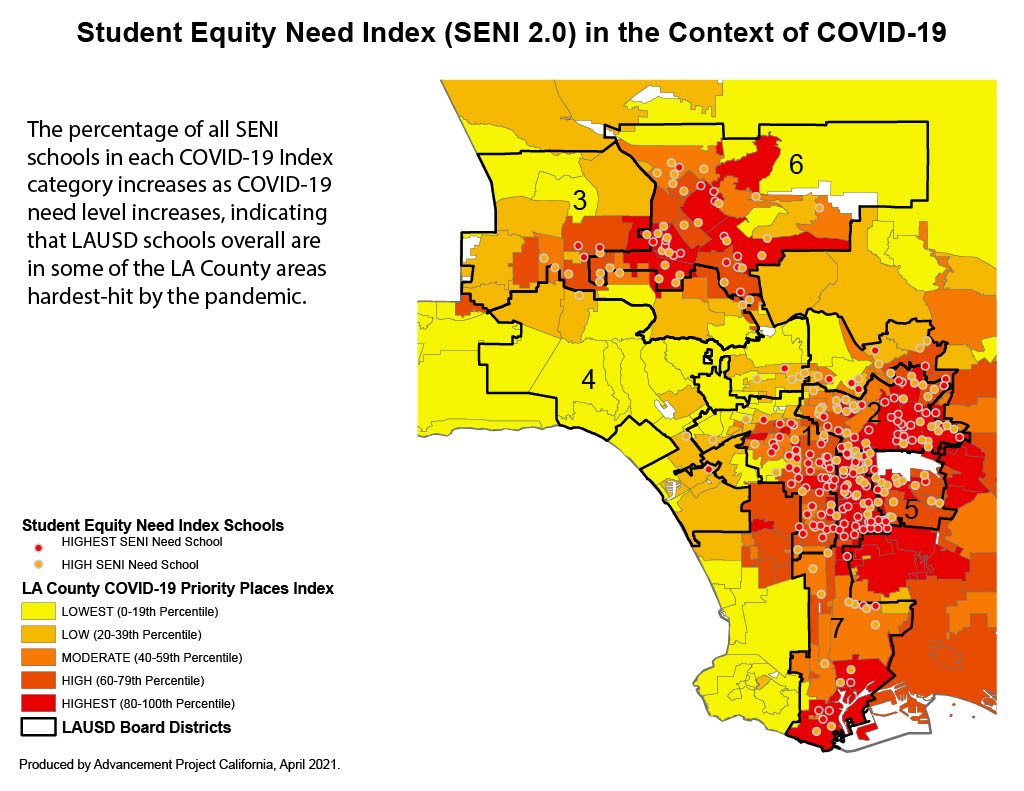
23 Aug Equity is Justice and the Fight for Racially Just Transformative Schools
By MIGUEL DOMINGUEZ | Director of Education & Youth Policy
Somewhere a volunteer reads to school children. At the same time, a patient receives steady medication. A lawyer provides legal services for low-income individuals. Elsewhere, a first-time homebuyer moves into his own home. National Nonprofit Day (NND) reminds us that each of these scenes is possible thanks to the nonprofit sector. It’s the result of the work performed by capable people and organizations.
Organizing groups throughout California fought for more than a decade for school budget reform, and in 2013, on the heels of successfully mobilizing voters to pass Proposition 30, pushed Governor Brown to pass the Local Control Funding Formula (LCFF). Declaring that “Equal treatment for children in unequal situations is not justice,” the governor’s newly enacted policy ensured that equity was at the heart of the distribution of dollars to school districts throughout the state. School districts with the highest percentage of low-income, foster care, and English Language Learners would see increased budget investments through “supplemental and concentration grants.”
Community Coalition (CoCo) members were involved in this statewide fight. They saw an opportunity to live into the spirit of the law by pushing for equitable funding in the Los Angeles Unified School District (LAUSD), which received the most significant investment as the largest school district in the state. This was an important fight for South LA students, parents, and community residents that faced the most considerable burdens from the great recession, fought for equitable dollars, and generated equitable investments into LAUSD.
In coalition with our partners on the Eastside, the InnerCity Struggle (ICS), and the Advancement Project CA (APCA), Community Coalition students, parents, and residents led the Equity is Justice Campaign that resulted in the creation of the Student Equity Need Index (SENI) in 2014. The SENI created a data-driven, community-led, and community-centered formula that identifies schools by need, prioritizes high-need schools in the district, and allocates LCFF dollars equitably. The community-led SENI policy signaled the most significant shift in the LAUSD’s funding strategy to address the achievement gaps that consistently leave highest-need Black and Brown students behind.
The most brutal fight was to convince decision-makers that what happens to students outside of schools impacts their academic outcomes and overall wellbeing; we should take into account the residents’ and neighborhoods’ social and economic conditions when allocating dollars and resources.
The now formalized coalition, the Equity Alliance for LA’s Kids, which includes CoCo, ICS, APCA, and the Partnership for Los Angeles Schools, has continued to fight since 2014 so that equity isn’t just a value but a core strategy and model to build from towards the transformative and racially just schools that high- and highest-need students in LAUSD need and deserve.
Today, the SENI includes a comprehensive set of indicators and has grown to $700 million, which is allocated to all schools in the districts benefiting the high- and highest-need schools in LAUSD uplifting areas like South LA, the Eastside, and the East San Fernando Valley. As a result, South LA schools have received millions in additional dollars, significantly benefitting the district’s Black and highest-need Latinx students.
In 2021, the school board adopted COVID indicators which hit these three communities the hardest.

LAUSD has used the SENI as more than a funding formula, but a tool to understand where to prioritize resources and make an impact, including, but not limited to, the following ways:
- Increase student support at school sites by hiring psychiatric social workers, hiring intervention coordinators, hiring attendance counselors, paying for planning time for teachers, and other vital interventions, including dedicated counselors to work with Black students and English Language Learners.
- Identify and prioritize schools in the district to be converted into Community Schools, which can move our local schools into racially just transformative ones.
- At the beginning of the COVID-19 pandemic, the district used the SENI to set up grab-and-go centers, providing daily meals to families at a critical time.
The data backs up the impact. For example, an independent study led by the American Institute of Research (AIR) shows that school-level distribution of resources within the district has been positively associated with needs, that SENI dollars have been spent on critical school-site positions, and that school sites have the flexibility to spend on things that specific school and community needs.
But the fight is not over, and we still have work to do.
Last spring, students and parents made it clear at our town hall with newly appointed Superintendent Alberto Carvalho that we must fight for equitable recovery as we move away from the COVID pandemic.
We can do this by doing the following:
- Commit all $1.4 billion in supplemental and concentration grants to the SENI to ensure that equity dollars are making an impact on the highest need students in the district
- Strengthen long-term implementation of the SENI to support multi-year budgeting to create stability in our local neighborhood schools
- Prioritize investments and intervention in high and highest need schools by leveraging SENI and other equitable dollars, including BSAP, so that we can center racial equity
- And most importantly, genuine and authentic engagement with Black and Brown South LA residents as co-decision-makers in their local schools and neighborhoods goes above and beyond existing committees to meet the needs of everyday people.
Now more than ever, these investments and interventions are necessary as the district moves towards a post-pandemic world in which tens of thousands of students are unaccounted for. This is unacceptable, and we have the policies and track record to lean into and empower our most systemically vulnerable, but inherently powerful communities.



No Comments